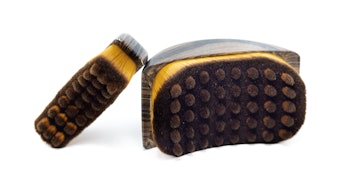A new study from Brigham Young University shows clean smells can encourage good behavior in people, and smell is often a key component of the spa environment.
We’ve all heard the adage about cleanliness being next to godliness, but a forthcoming study in the journal Psychological Science may have empirically proved it. According to researchers at Brigham Young University in Provo, Utah, a few spritzes of citrus-scented household cleaner can actually make us more virtuous.
“We wondered if you could regulate moral behavior through cleanliness and decided to look at olfaction and clean scents,” says Katie Liljenquist, lead author of the study, titled "The Smell of Virtue." “And at some level, it does seem to elevate people’s core choices. These clean scents activate moral awareness.”
Or at least better behavior. The study, which involved nearly 130 male and female undergraduate students, divvied participants into two rooms—one unscented and one spritzed with citrus-scented Windex. Researchers then conducted two experiments. In the first, the participants were given $12 cash and told that an anonymous partner in the next room expected them to divide it fairly. In practice, the folks in the clean-smelling room returned nearly twice as much money as those in the non-scented room.
In the second experiment, participants in both rooms were asked how willing they would be to donate time and money to the charitable organization Habitat for Humanity. Participants in the clean-scented room not only were more willing to volunteer time, 22% of them were likely to donate money, compared to only 6% of those in the unscented room.
Promoting virtue instead of vice
“As an ethics researcher, I read stuff all the time about saints turning into sinners, missteps people make in an ethical domain,” says Liljenquist, assistant professor of organizational leadership and strategy at BYU’s Marriott School of Management. “But there’s little research that shows what can promote virtue instead of vice. This is refreshing.”
Liljenquist is quick to point out that the specific type of cleaning product is less important than the nice smell it produces, and that S.C. Johnson, the company that makes Windex, had nothing to do with the study. “There was a Walgreen’s near the campus and we bought what was handy on the shelf that was citrus-scented," she said. "It just happened to be Windex.”
Dr. Alan Hirsch, founder and neurological director of the Smell & Taste Treatment and Research Foundation in Chicago, says he’s not at all surprised by the findings linking clean smells to good behavior. “It goes along with literature in the past that suggests pleasant odors tend to induce positive moods,” he says. “When you’re in a positive mood, you tend to be more generous.”
The way participants feel about an odor, though, also makes a difference, he says. “If people like the smell, it has a positive effect on them and whatever they’re doing,” he says. “If they dislike the odor, it tends not to have that positive effect.”
Unpleasant odors, in fact, have been shown to make people more aggressive, says Hirsch. “We looked at a school across the street from a mulching site,” he says. “And on days when the bad smells would waft across the street to the school, there was an increase in behavioral problems in the kids.”
Can clean smells reduce crime?
p>Liljenquist says she hopes the research linking clean smells to virtuous behavior will prove useful for the workplace—and for businesses that cater to the public.
“Evidence suggests that money could be better spent on lemon-scented air fresheners or janitorial services than on costly surveillance systems,” she says. “It could deter theft among customers and encourage pro-social behavior in the workplace.”
The new findings might even help cities with crime or vandalism, she says. “Instead of hiring more cops to patrol a beat, you could ostensibly try tidying up the environment,” Liljenquist says. “It could be a very cost-effective and non-manipulative way to influence people for good.”
Carol Terry, a 53-year-old librarian from Spokane, Washington, says she’s definitely observed the effect of a clean environment on patrons at the libraries where she’s worked. “If there’s a sitting area at the library that’s clean, it stays clean,” she says. “And if there’s a corner somewhere that’s messy, it quickly gets messier and messier. It may be more of a psychological thing as opposed to a smell thing, but the smell thing may come into it. I know in a clean restroom, I clean up after myself more, wiping away drops from around the sink with my paper towel after washing my hands.”
How do clean smells affect her personally? “Just talking about it makes me want to pull out my orange-scented wipes and use them,” she says.
Not surprisingly, Liljenquist thinks parents might be particularly interested in her findings. “It’s not necessarily a panacea for childhood rebellion, but I do think in general, if you ask your kids to clean their room, they might clean up their act, too,” she says. “My mom was quite a neat freak growing up. I think she feels vindicated by this research.”
By Diane Mapes, MSNBC.com, October 30, 2009










